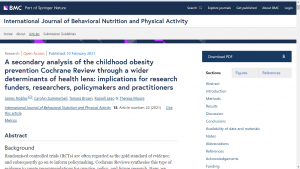Analysing the studies behind Cochrane’s ‘Interventions for Preventing Obesity in Children’ review
Over the last 30 years, research has made it clear that we need to create healthier environments to prevent childhood obesity. We now understand that obesity is the result of many different factors that all connect to one another. These include how our environment enables physical activity, the influence of social circles, genetic factors and whether we have a tendency to gain weight. In 2007, a government report identified 108 factors that contribute to the population’s levels of obesity.
High-quality evidence is key to policymaking. Randomised control trials (RCTs) – which give one group of people an intervention and compare the results against a group who do not receive the intervention – are often regarded as gold standard of high-quality evidence. By intervention, we mean some sort of intentional effort to help address childhood obesity, for example programmes to encourage participation in sport or policies around the amount of sugar in drinks.
Policymakers often use the findings from RCTs to inform their decisions, including in childhood obesity prevention. In a well-researched area such as childhood obesity, looking at all the findings from the RCTs takes a lot of time. This is why ‘systematic reviews’ of RCTs are helpful. Systematic reviews combine the findings from all the RCTs on a topic, making the evidence from them more accessible to researchers and policymakers.
The Cochrane Collaboration are known to produce the most robust systematic reviews. Their reviews are used to inform national and international policy. Since the early 2000s, they have updated their review on how to prevent childhood obesity four times. The most recent update in 2019 included evidence from 153 RCTs.
We wanted to understand what the RCTs included in the Cochrane review focused on, and how they map against the complex causes of obesity. We also wanted to see whether the focus of the RCTs had changed over time (between 1993 and 2015) and between children in different age groups. The most recent review includes all the trials that were included in the three previous Cochrane reviews.
What we did
We analysed the RCTs included in the 2019 Cochrane Review ‘Interventions for Preventing Obesity in Children’. Two researchers independently analysed which causes of obesity the studies aimed to address.
Because there are so many causes of obesity, we used a Public Health England tool to help this process. This tool groups the causes of obesity into one of five categories called the wider determinants of health:
- biological factors
- individual lifestyle factors
- social and community factors
- living and working conditions
- wider conditions
Two thirds of the causes of obesity are related to living and working conditions and wider conditions. We categorised the interventions tested in the 153 trials against these wider determinants of health.
What we found and what this means
Despite broad acknowledgement that obesity is caused by a wide range of factors, over 90 per cent of the trials had some focus on changing individual lifestyle factors, such as physical activity or diet. This was most often achieved through the delivery of educational sessions. There was also a strong emphasis on living and working conditions, although this mostly meant training teachers so that they could teach children about how to improve “lifestyle behaviours”.
Surprisingly we also found that the focus of these studies hadn’t changed much since 1993. They persisted in their focus on directly changing diet and physical activity, despite demonstrating very limited effectiveness. Interventions aimed at different age groups also had this same focus.
Our findings suggest that there is an imbalance between the causes of obesity and what trials to prevent childhood obesity focus on. This skewed focus has endured since the early 1990s and persists despite the growing recognition that population-level obesity is a complex systems issue.
What next?
Cochrane reviews and RCTs inform policymaking, and therefore influence how national and local governments seek to prevent childhood obesity. If the focus of these RCTs remains upon changing individuals diet and physical activity behaviours, then the policy that follows may have a persistent focus on individuals rather than the environments in which they live.
Our findings are particularly important for three groups:
- Policymakers should be aware that the evidence base is skewed towards educational interventions that target individual diet and physical activity. It’s well known that obesity is a complex problem, so interventions need to address this complexity. Consider approaches that target the ‘upstream’ determinants of obesity such as living and working conditions rather than the ‘downstream’ determinants such as diet and physical activity.
- Research funders should also be aware of this imbalance in the focus of RCTs. It is important to start considering other research designs which may be more appropriate for the evaluation of complex approaches to preventing childhood obesity. RCTs may not be the best approach.
- Researchers need to develop new research approaches which account for the complexity of obesity when developing or evaluating interventions. This could include using alternative research designs to better understand how interventions can work upstream. Researchers should consider how interventions may help change the systems that encourage obesity, rather than solely focusing on whether they change the prevalence of obesity itself. Single interventions are also very unlikely to prevent childhood obesity.
Paper

A secondary analysis of the childhood obesity prevention Cochrane Review through a wider determinants of health lens: implications for research funders, researchers, policymakers and practitioners
Read the paperRelated research projects
This project builds on the previous work to update the Cochrane review on preventing childhood obesity.
Lead collaborators
- Professor Carolyn Summerbell, University of Durham
- Dr Tamara Brown, University of Stirling, University of Teesside
ARC West Staff
Professor Russ Jago
Co-Theme Lead, Public HealthPartners on this project
University of Bristol
The University of Bristol is internationally renowned and one of the very best in the UK, due to its outstanding teaching and research, its superb facilities and highly talented students and staff. Its students thrive in a rich academic environment which is informed by world-leading research. It hosts the Elizabeth Blackwell Institute for Health Research.

